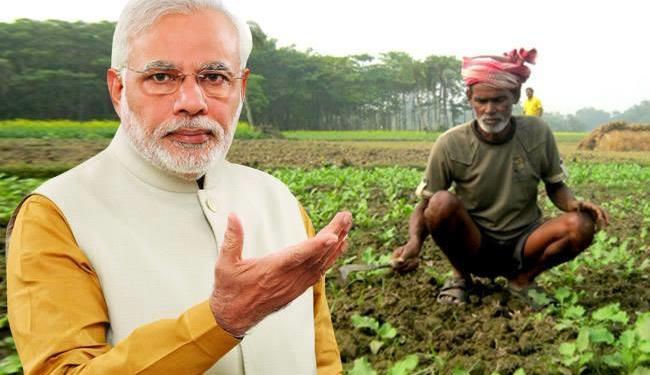In its last budget before the country goes to polls this year, the Modi government made a crucial announcement. It announced a new scheme called, “Pradhan Mantri Kisan Samman Nidhi (PM-KISAN)”. The scheme will provide an additional support income of RS. 6,000 per annum to small farmers owning land upto 2 hectares. The scheme is going to be 100% funded by the Government of India.
The Modi government has planned the PM-KISAN scheme in every possible detail in order to ensure that there are no leakages and the benefit actually reach the targeted beneficiaries. The financial benefit of Rs. 6,000 will be provided to the beneficiaries in three equal installments of Rs. 2,000 each in a period of every 4 months in a financial year. The benefit is going to be admissible for transfer with effect from 1.12.2018.
Who is a small and marginal farmer for the purposes of the scheme has also been clearly defined. For the purpose of calculation of the benefit, it is defined as “a family comprising of husband, wife and minor children (up to 18 years of age) who collectively own cultivable land up to 2 hectares as per land records of the concerned state/ union territory.”
As far as identification of the beneficiaries is concerned, those whose names appear in land records as on 01.02.2019 shall be eligible for the benefit. Therefore, the Government of India has made it a point to ensure that no one is able to fiddle with the scheme. The government has avoided the possibility of fake beneficiaries making use of this scheme, as 01.02.2019, i.e. the date of announcement of the scheme has been taken as the cut-off date. Any changes made to the land records thereafter shall not be considered for eligibility of the benefit to the new landholder for the next 5 years. However, the Scheme benefit will be allowed on the transfer of land records by succession. Moreover, if a Landholder Farmer Family (LFF) has parcels of land spread across different villages/ revenue records, then such land will be pooled in order to determine the benefit. Now, the onus is on the States/ UTs to complete updation of land records in order to ensure proper identification of beneficiaries.
The Government of India has also taken into consideration the peculiar circumstances prevailing in the North-eastern states. The land ownership rights in some of the North-eastern states are community-based. In such States, an alternate implementation mechanism will be developed and approved by the Committee of Union Ministers of Ministry of DoNER, Ministry of Land Resources, Union Agriculture Minister and concerned State Chief Ministers or their Ministerial representative.
The states are also required to prepare a database of beneficiary Small and Marginal landholder farmer
families in the villages capturing the Name, Gender, whether belonging to SC/ST, Aadhaar Number (Aadhaar Enrollment Number in case Aadhaar Number has not been issued), Bank Account Number and Mobile Number of the beneficiaries. For transfer of the first installment of benefit for the period 01.12.2018 to 31.03.2019, Aadhaar number shall be collected wherever available and for others alternate prescribed documents namely driving licence, voters ID card, NREGA Job Card, or any other identification document issued by Central/ State/ UT Govts or their authorities etc. can be collected for identity verification purposes. The government has already been particular about ensuring the direct transfer of benefits to the beneficiaries in order to prevent leakages. And this scheme is set to be implemented in a similar manner.
A Project Monitoring Unit (PMU) at the Central level will be set up in DAC&FW. This unit shall be tasked with the responsibility of overall monitoring of the scheme and shall be headed by Chief Executive Officer (CEO). The states/ UTs will also be required to designate a Nodal Department for implementation of the Scheme. The Government of India will also provide suitable administrative expenses to State/ UT governments to cover their expenditure on PMUs.
In order to ensure transparency, it has been provided that the beneficiary lists should be displayed/ verified at Gram Panchayats to ensure transparency and accuracy of the list. Therefore, there is going to be sufficient publicity and transparency as far as this historic scheme is concerned.
The Modi government has not only announced an ambitious scheme but it has also ensured that the PM-KISAN scheme is properly implemented. It is set to take all steps in order to ensure that the PM-KISAN scheme is implemented in an effective and efficient manner. Transparency in governance has been a defining characteristic of the Modi government. And the government is going ahead with this ambitious move in a similar manner.

























